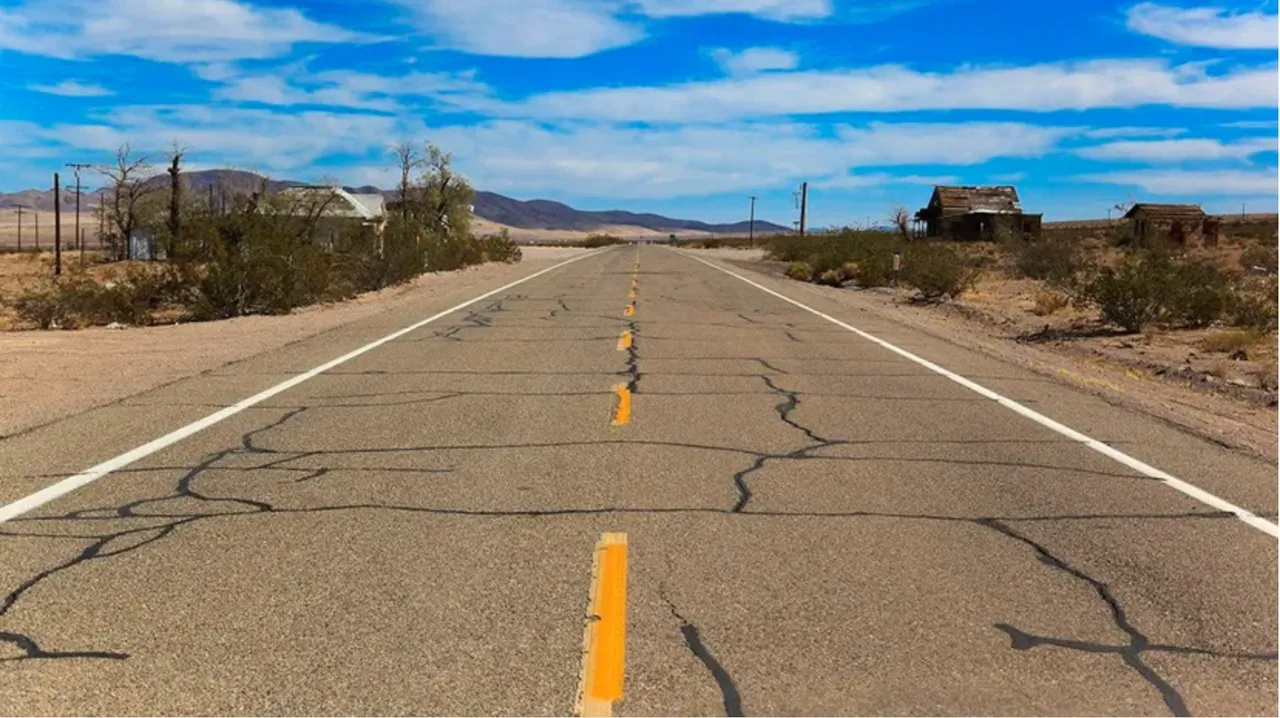
I was driving the other day and just happened to notice a lot of those thin black squiggly lines that snake their ways across most roads I travel. Now, it's not like I've never noticed them before, but on this particular day, I did notice them, and they got me to thinking a little.
If you've never seen these lines before (see the image below for an example) or if you simply don't know what they are for, let me briefly take you to school:

Essentially, they are thin strips of tar that councils, governments, or whoever it is that look after the roads in your area, use to repair little cracks in said road. The idea being, that they can give a much longer life to these roads so that they don't need to be torn up all the time and cost the tax-payer an exorbitant amount of money on continual repairs. While they look quite ugly, they are actually exceptionally useful and serve a valuable purpose, however, their value and purpose is not what seeing them got me thinking about.
As I looked at those smooth wavy lines propel themselves under my car, I couldn't help but consider the idea that they were the result of degradation and decay. That as time had mercilessly beaten it's fist against the asphalt I was driving upon, the road had inexorably become weathered and cracked.
That first thought then got me thinking further about the idea of decay, and that unless care is given, all things eventually fall into disrepair. I cannot think of too many things in this world that do not grow old, or need maintenance of some type, or decay if they are not given the proper care and attention required (if you can think of something that doesn't need care to stay pristine, then you are better than I am at this, and I invite you to share it in the comment section, however, my caveat is that it must be a tangible object. Obviously, something like an NFT will remain a fine specimen without care).
Consider teeth. Without daily brushing, flossing and regular dental checkups, they will decay and eventually fall out. What about your car? Any mechanic will tell you that regular servicing of your vehicle will ensure that it remains road worthy for a good few decades (longer if it was built before they became plastic!), and that without that servicing, the various parts and substances in the motor, and around the car, will grow old, tired and rusty, and cease to function correctly. Even the humble lawn you frantically cultivate outside needs your maintenance to keep it orderly and well groomed.
One last, example I have of this was from my army days, way back when I was a rubbery young thing who didn't need to shave very often. Early on, in my time at basic training, our commanding officers (they weren't really officers, just Corporals) gave us some little bits of brass. Some were oddly shaped and we had no idea what they were for. A few others had a bit more distinction about them and we could guess what they may have been for, but alone they were still fairly ambiguous. All we really knew about them was that they were used on and around the belt of our dress uniform.
But wait! They don't look very 'dressy'. How do we use these on a dress uniform?
The problem with these little bits of oddly shaped brass was that they were completely tarnished. They looked horrible! The entire platoon was kind of wondering how these decayed and pitted pieces of dress uniform were ever going to get to have that beautiful shiny finish that brass can have. A complete lack of care had caused them to take on a dull brownish appearance. In some places, they looked almost grey/white, and in other places, there was even a slight greenish tinge. They were scarred with little pit marks from being knocked against other oddly-shaped bits of brass. They were truly deplorable.
The answer to our concern over how the brass was going to be restored to it's original lustre was quick in coming. The corporals didn't really waste any time in producing 28 bottles of 'Brasso', a heap of fine grain sandpaper and some polishing cloths. We were expected to bring these decayed pieces of brass back to life through sheer elbow grease, determination and hard work.
In the weeks that followed we spent every spare moment 'polishing our brass'. It didn't matter where were were, or what phase of our training we were in. Each recruit had their sandpaper, polishing cloth and one or two pieces of brass within hands reach so that they could keep working on the pits and grime as soon as there was a break in training. At the range and not firing? No problem! Brass polishing time! On a pack march? Easy! Out came the brass. In the dorm an hour before lights out? You can bet your bottom dollar, everyone was polishing their brass.
We spent weeks caring for these objects, carefully honing them back to their former glory, and as each piece passed inspection and we came closer to having the full set complete, we became more and more cautious with them. You can imagine the furor caused if someone accidentally dropped a nearly complete piece on the floor. Boy, it got ugly at times! People would wrap them up as carefully as possible, and only touch them with a cloth in order to avoid getting fingerprints on them. The more we worked on them, the more we cared for them. And it seems, that is the problem with deterioration. The only way to either avoid, or fix it, is to exert energy in the form of hard work.
It's a battle taking care of things.
As I pondered, and my thoughts roamed from initial interest in the bits of tar on the road, to the idea of all things decaying, to the brass and bringing it back to it's former glory, I found myself moving from contemplating things, to contemplating us. Humans, and the way that we can decay over time too, especially if not cared for properly.
As morbid as it sounds, from the second we're born, we are moving ever so slowly towards death. From the moment we leave the safety of the womb and take our first breath, we're ageing, and a side effect of age, is the requirement for maintenance. If not maintained, our bodies will break down sooner than intended, and like the road, need cracks to be filled. This is the physical. What of the mind?
Our brains, being the complex organ they are, need to be cared for and nurtured too. Too little care, and they can become tarnished just like the brass that I was handed all those years ago, and unlike the physical body, that is (in the scheme of things) relatively easy to repair if, and when, required, the brain is far more difficult to put back together.
This all got me to thinking (yes! more thinking) of the various ways we tend to ourselves. How we care for ourselves. Unlike brass, or roads, or lawn, taking care of ourselves is much more important, and at present, I don't come across too many people who aren't facing a difficulty of some sort. This pandemic has tarnished us in many ways, and I thought it might be nice to hear how you are putting in the hard yards and taking care of yourself, but further to this, how do you care for others.
Sometimes, we look at the tarnished decayed outside of something and all too quickly write it off as not being salvageable at all, but what if all it needed was a little care? With the brass that I worked on so diligently, the reality was, that when I was given it, at first, it looked horrible, and it would have been easier to leave it as it was. However, with a bit (actually, a lot) of grit, the outer layer was removed, and what was under it was much more pleasing to he eye. The reality was, that the value I had been seeking, was only a thin layer deep. It had always been there - it had just been slightly obscured by the tarnish that needed to be cleaned away.
So now it's over to you. If what you have read here has given you pause for thought, please, pause for just a little longer and type some of your ideas in the comments section.
